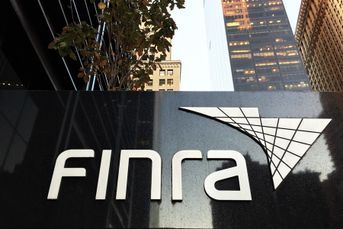Merrill, bloodied but unbowed, fights on
Merrill Lynch & Co. Inc. is standing tall, after recently shrugging off a shower of humiliating blows. Last…
Merrill Lynch & Co. Inc. is standing tall, after recently shrugging off a shower of humiliating blows.
Last week, the New York-based company reported fiscal second-quarter earnings that beat analysts’ estimates, posting increased profits for the first time in 18 months. The firm’s private-client group also did better than expected, given the economic and market climate.
The pummeling taken by Merrill’s shares in the market since its troubles began in April now makes the stock even more attractive, says Mark Constant, a San Francisco-based senior vice president and senior equity research analyst with New York’s Lehman Brothers Inc. He rates Merrill a “strong buy.”
“It’s the most attractive firm on the Street,” Mr. Constant says.
The stock closed at $37.93 Thursday, down 31% from $54.99 April 1, shortly before New York state Attorney General Eliot L. Spitzer an- nounced that his office was investigating the company.
Valuations for the brokerage sector are attractive at the moment for most firms, Mr. Constant says. Trading volume is increasing, and underwriting also is picking up, he adds.
“There’s good value out there,” he says. “With Merrill, the market overreacted the most, despite the profit initiatives” of reducing costs and cutting jobs.
Building profits
Last Tuesday, Merrill reported that it was back to building profits in the just-ended second quarter, after seeing earnings fall for six consecutive quarters.
Cost cutting helped earnings rise 17% in the quarter, compared with the same period last year. The company earned 66 cents per share, 8 cents above analysts’ consensus, according to Thomson Financial/ First Call of Boston, and 10 cents higher than in the second quarter of 2001.
That’s one piece of good news for a company that has been beset by difficulties this year.
Merrill has weathered a storm inside and outside the firm, with the outlook darkening in April. At that time, Mr. Spitzer said his office was investigating Merrill for conflicts of interests between its investment bankers and stock analysts over a number of Internet stocks.
In May, Merrill agreed to pay a $100 million settlement, without admitting any wrongdoing or liability. Its second-quarter earnings accounted for that payment.
But the bad news didn’t end with the settlement. Last month, Merrill suspended broker Peter E. Bacanovic for his involvement with trades of ImClone Systems Inc. last year on behalf of home-decorating queen Martha Stewart – just before the biotech company received bad news from the Food and Drug Administration.
In addition, Merrill has seen scattered defections among its 15,100 brokers, including the departure earlier this month in New York of two big producers who went to rival Salomon Smith Barney Inc.
The president of Merrill’s U.S. private-client group, James Gorman, tried to rally his troops last Wednesday during a video conference. In reviewing the positive earnings, Mr. Gorman praised the brokers for the $4 billion in net new assets they had brought in during the quarter, down from $5 billion in the second quarter of 2001.
Pre-tax earnings for the private-client group shot up 97% to $2.3 billion for the recent second quarter, compared with a year earlier. Revenue, however, fell 8%.
One veteran Merrill broker, who asked not to be identified, is surprised that the firm brought in so much cash during a time when it was dogged by the state investigation into its stock research.
The broker also says that morale at the firm is low.
The broker adds that if the company hadn’t taken the tough, job-cutting measures driven by president and chief operating officer E. Stanley O’Neal, its performance wouldn’t have been so positive.
Merrill cut 1,800 jobs during the second quarter, many of them in Japan.
Out the door
But the pay package that rewards brokers for selling fee-based accounts attracted big-producing brokers to the firm, Thomas Patrick, the firm’s chief financial officer told analysts during a conference call last Tuesday.
Despite the mostly upbeat financials, some Merrill brokers have opted to leave.
On July 10, Jerome Lachs and Harry Lewkowitz, who produced, sources say, between $1.8 million and $2 million annually in commissions, left Merrill’s office in New York’s Citicorp building and moved to join Salomon Smith Barney on another floor.
The reasons for their departures weren’t clear, sources inside and outside the firm say, but the recent scandals aren’t thought to have been a factor.
One possible reason behind their jumping ship is that Merrill, like many other companies on Wall Street, is nickel-and-diming its brokers right now, charging them for support and services, fees the firm used to pay for them, the sources say.
Merrill, however, is cutting deals with new brokers to pick up the tab for some services, and that practice may have angered Mr. Lachs and Mr. Lewkowitz and hastened their departures, the veteran Merrill broker says.
Learn more about reprints and licensing for this article.








